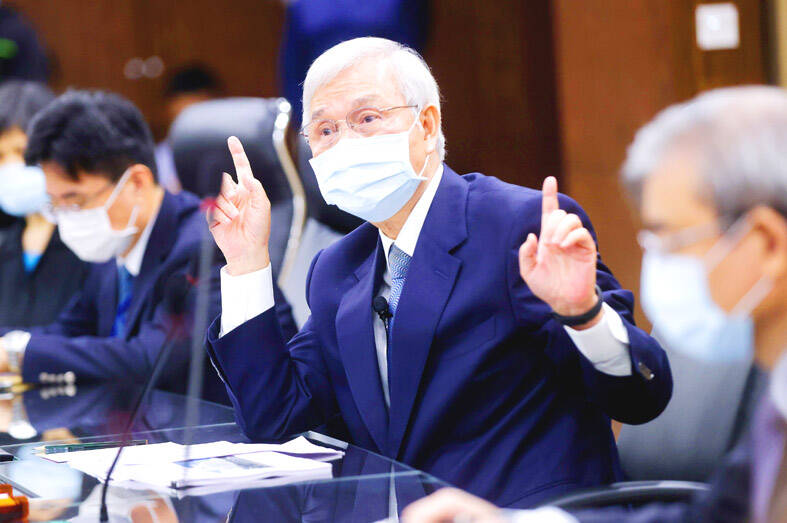The central bank yesterday left its policy rate intact for the third straight quarter, saying that inflationary pressure has moderated and a policy pause would help support the economy amid lingering global uncertainty.
Governor Yang Chin-long (楊金龍) made known the decision after the quarterly board meeting and hinted at potential rate cuts next year if the consumer price index (CPI) returns to the 2 percent target and the US Federal Reserve turns its monetary policy stance around.
The Fed held its policy rate steady overnight, with Fed Chair Jerome Powell telling a news conference that a recession is not necessary for rate cuts. The Fed’s dot plot, which shows Fed directors’ estimates for interest rates over the long run, signals a reduction of 75 basis points next year.

Photo: I-Hwa Cheng, Bloomberg
“Taiwan’s economy is too small and open to stay above external influences and chart its own monetary policy path,” Yang told reporters.
Capital movements beat interventions in dominating foreign exchange markets and currency directions, the governor said, adding that the Fed’s dovish rhetoric lifted bourses across the world and currencies gained value against the greenback.
Taiwan’s monetary tightening is also approaching an end, although the central bank would likely maintain its current stance in the first half of next year, Yang said.
He quoted Powell as saying that the COVID-19 pandemic taught global central banks a hard lesson on “unpredictability” as the Fed governor last month reiterated that interest rates would “stay high for longer.”
Yang painted Taiwan’s 2.9 percent CPI increase last month as weather-driven and that inflation would ease to 1.89 percent next year.
At the same time, the nation’s economy would come under continued challenges from geopolitical tensions and economic slowdown from the US and China, which account for more than 50 percent of Taiwan’s exports, the governor said.
The negative output gap is expected to deepen from 0.5 percent this year to 0.84 percent next year, meriting a policy pause despite an ongoing recovery, Yang said.
The central bank is looking at GDP growth of 3.12 percent next year, from a 1.4 percent this year. Central bank officials attributed the uptick mainly to a low base.
Board directors shared similar observations and arrived at the conclusion unanimously, he added.
The central bank did not introduce fresh measures to tighten property or land transactions, saying that previous waves of lending restrictions have achieved the effect of slowing price hikes, he said.
However, the property market remains on the central bank’s radar and it would move to regulate whenever it sees fit, he said.
The property market breathed a sigh of relief at the central bank’s rate pause, which fell in line with market expectation, Great Home Realty Co (大家房屋) said.
Property speculators have largely fled the market, leaving people with real demand to underpin transactions, Great Home chief researcher Mandy Lang (郎美囡) said.

Taiwan Semiconductor Manufacturing Co (TSMC, 台積電) yesterday said that its investment plan in Arizona is going according to schedule, following a local media report claiming that the company is planning to break ground on its third wafer fab in the US in June. In a statement, TSMC said it does not comment on market speculation, but that its investments in Arizona are proceeding well. TSMC is investing more than US$65 billion in Arizona to build three advanced wafer fabs. The first one has started production using the 4-nanometer (nm) process, while the second one would start mass production using the

When an apartment comes up for rent in Germany’s big cities, hundreds of prospective tenants often queue down the street to view it, but the acute shortage of affordable housing is getting scant attention ahead of today’s snap general election. “Housing is one of the main problems for people, but nobody talks about it, nobody takes it seriously,” said Andreas Ibel, president of Build Europe, an association representing housing developers. Migration and the sluggish economy top the list of voters’ concerns, but analysts say housing policy fails to break through as returns on investment take time to register, making the

‘SILVER LINING’: Although the news caused TSMC to fall on the local market, an analyst said that as tariffs are not set to go into effect until April, there is still time for negotiations US President Donald Trump on Tuesday said that he would likely impose tariffs on semiconductor, automobile and pharmaceutical imports of about 25 percent, with an announcement coming as soon as April 2 in a move that would represent a dramatic widening of the US leader’s trade war. “I probably will tell you that on April 2, but it’ll be in the neighborhood of 25 percent,” Trump told reporters at his Mar-a-Lago club when asked about his plan for auto tariffs. Asked about similar levies on pharmaceutical drugs and semiconductors, the president said that “it’ll be 25 percent and higher, and it’ll

CHIP BOOM: Revenue for the semiconductor industry is set to reach US$1 trillion by 2032, opening up opportunities for the chip pacakging and testing company, it said ASE Technology Holding Co (日月光投控), the world’s largest provider of outsourced semiconductor assembly and test (OSAT) services, yesterday launched a new advanced manufacturing facility in Penang, Malaysia, aiming to meet growing demand for emerging technologies such as generative artificial intelligence (AI) applications. The US$300 million facility is a critical step in expanding ASE’s global footprint, offering an alternative for customers from the US, Europe, Japan, South Korea and China to assemble and test chips outside of Taiwan amid efforts to diversify supply chains. The plant, the company’s fifth in Malaysia, is part of a strategic expansion plan that would more than triple